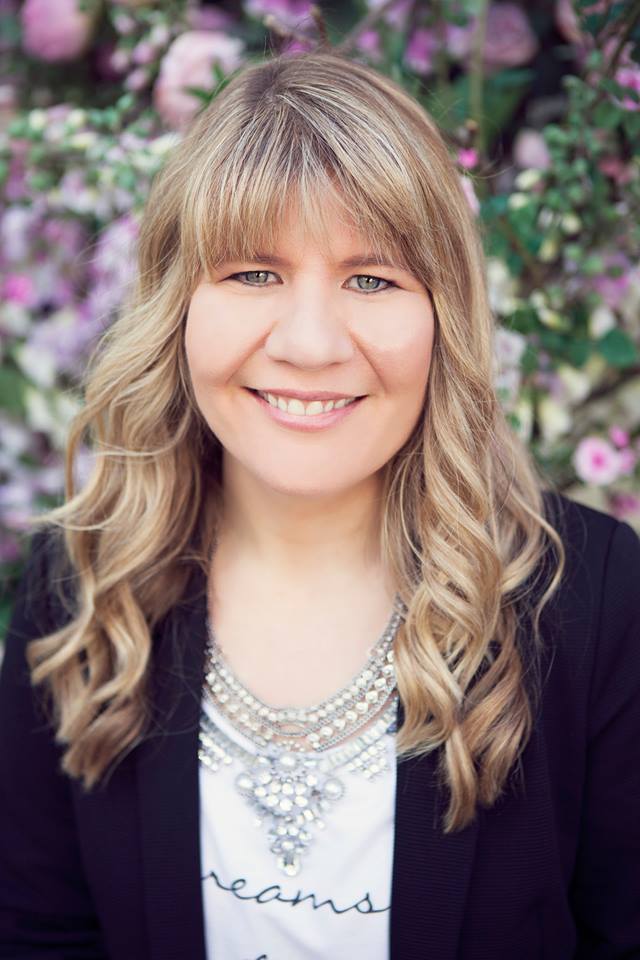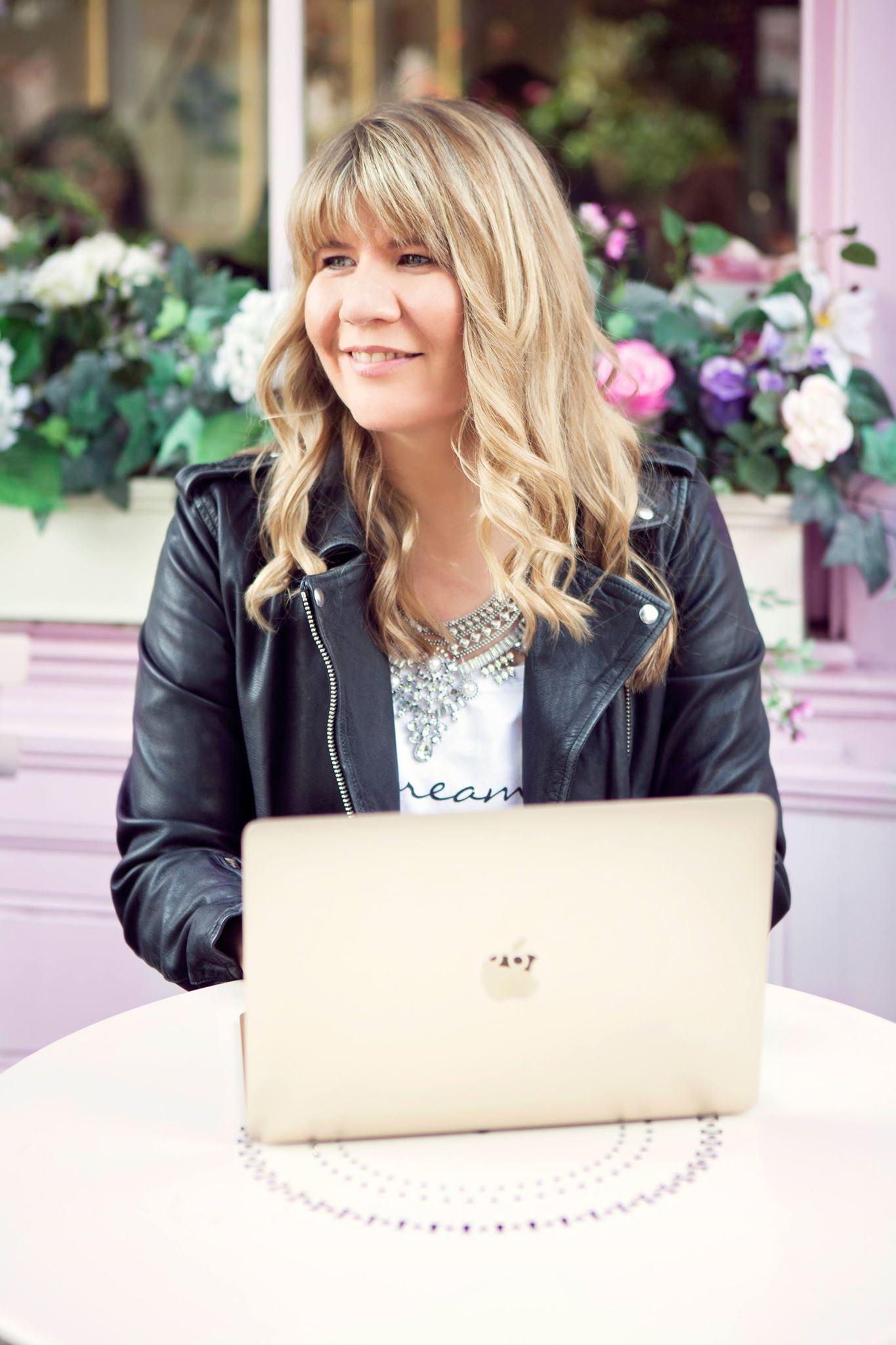Emma Ward is a business confidence coach and the person behind the ‘Where Soul and Sales Collide’ Facebook group. Emma left her teaching career 10 years ago to become a personal stylist, which gradually evolved into a profitable coaching business – and has help hundreds of female entrepreneurs discover their confidence, follow their passion and get paid to do what they love.
– Hi Emma, first of all I want to say that your story *really* resonated with me – I have worked as a university teacher on and off for the last 5 years and when I left my last job in December 2017, I was feeling totally drained. Can you tell me when you had this ‘Aha!-moment’ that teaching maybe wasn’t right for you?
I’m glad it resonated – I think there are a lot of people in jobs that completely drain them and because so many people feel that way it’s almost became accepted as see as an inevitable result of being a working adult.
It was less of an aha moment and more of a wake up call. I became so ill that I ended up in hospital and came out in a wheelchair unable to even wash my own hair because I didn’t have the strength.
I’d been filled with fear at the thought of looking for something else to do. I kept telling myself that I had nothing else to offer besides teaching and that even if I could find something I’d never make any good money from it.
I then got made redundant from my teaching job. Ha! I always say that was life trying to stop me making a mistake.
A part of me knew I couldn’t just go and find another job (not least because I wasn’t fit enough to work full-time) but that I needed to do something that felt more fun and so I followed one of my passions and trained to be a Personal Stylist and started a business.
– So your first step after you were made redundant was to train as personal stylist. How do you remember this time in your career? What did you learn about business from this experience?
I remember this being a really exciting time but when I look back I can now see that I spent and awful lot of time procrastinating by wasting countless hours on things that don’t bring in clients e.g. branding, colours, logos, perfecting a website.
This was my brains way of convincing me that I was moving forwards in my business because I was ‘busy’ but essentially it was just a clever delaying tactic.
I was pretty clueless when it came to running a business to be honest. I listened to people I shouldn’t have (people who’d never run a business or never run a business like mine).
I learnt the importance of asking the RIGHT people for help. I learnt the importance of getting out there and in front of my ideal clients rather than hiding behind my laptop.
I also learnt the importance of doing the inner-work when it comes to running a business. I had to increase my confidence and once I did those things everything took off.
– When did you decide that being a business coach is what you really want to do?

I’d been a Personal Stylist for about 4 years and I found it more and more frustrating that many of the women I was working with didn’t have the confidence to wear the outfits they told me they wanted to. I wanted to help them on a deeper level.
Having done so much work on myself (the internal mindset work) to increase my own confidence, I was obsessed with how our brains work and I knew I was ready to offer a different type of service.
Then one of the UK’s most successful Life Coaches advertised that she was running Confidence Coaching Training workshops in London. I signed up to become one of her coaches on the spot.
From the day I went into that training room and had my first practise client I just KNEW that coaching was the thing I was meant to do.
I went on to do another year-long coaching diploma and was a Confidence Coach for about 3 years.
Over that time, I started attracting more and women who wanted help with their confidence who were also business owners. So, once we’d increased their confidence, they asked me to help them with their businesses.
It was like all the pieces of the puzzle fitted together. Everything about my journey had come to that point and I had so much to share because I’d been running a business for 7 years at that point. It still gives me goosebumps thinking about that moment.
– What helped you most on the road? How did you get your first clients?
What helped me most is when people got to experience what it’s like to work with me and my methods, I learnt that from my Personal Styling business. When I’m out there talking to people and showing them how I can help, that’s how I get my clients.
I’d been running style workshops for a few years and so I started asking my contacts if I could run some goal setting and confidence workshops and that’s how I got my first coaching clients.
Even to this day, I find talks, videos and Facebook Lives to be one of the best ways to get clients because people get to really see and feel who I am and how much I can and want to help them.
That’s what I always encourage all my business coaching clients to do – help people and let people see what you can do. Then they want more of you so they’ll hire you.
– What was the highest and the lowest point in your career as a business coach? When did you have the feeling ‘I made it’? Did you ever feel like giving up?
I’m always tweaking my goals and aiming bigger so I wouldn’t ever say I’ve ‘made it’ but I think that moment when I really felt that I was exactly where I wanted to be was when I got my first International Client. And then the time I reached a huge money goal I’d been working on.
Oh yes, I have definitely felt like giving up and on more than one occasion over the last 10 years, I can assure you of that.
I’ve even got to the point where I started job-searching on Google! It’s never for long though because I know that’s not what I want and I’ve come too far to give up.
I let myself have a pity party and a good cry for a day and I now know that’s my sign that I’ve been working too hard and I need to take a step back and make some tweaks in my business.
I’m no longer scared of that feeling though because every time I come to that crossroads and take some time out, I come back stronger and go to another level of success in my business. For me, it’s about listening to my body and my gut-instinct because they always know best.
– So, what does a ‘business confidence coach’ do exactly? How do you work with your clients? And who is your average client?
My average client is a female service-based business owner who want more success, clients and money.
I coach her to get clear on who her Ideal Client is, what that Ideal Client wants and needs and where they are and how to get in front of them.
But marketing isn’t enough. Anyone can know who they want to work with and how they can help but that doesn’t mean they consistently put themselves ‘out there’.
There are many reasons we stop ourselves from doing the things we know we need to in order to be successful. We sabotage ourselves, we put things off, we lack confidence and so as well as the business structures that need to be in place, I coach clients to increase their confidence and change the way their brain sees success so they take the big, bold action steps that are required to get known by hundreds of thousands of their ideal clients every single day.
– What is the biggest challenge for your clients?
When clients come to work with me their main challenge is knowing how, and then actually taking the action, to get in front of the right people on a consistent basic.
They either don’t know the best methods to market themselves or, if they do, they tend to procrastinate on the things they know they should be doing to bring in clients.
They often haven’t done the mindset work that is paramount to success – to be confident and believe they absolutely CAN be paid great money to do what they love.
– Why do you think so many women in business struggle with confidence? What impact does this have on their personal finance and career success?
I think it’s partly to do with centuries of wiring that stops us from wanting to put ourselves out there in a bold way.
It’s very common for women to fear what other people will think of us if we are wildly successful so our brain panics and tries to keep us in a more ‘comfortable’ environment. The irony of this is that our comfort zone is far from comfortable.
Women tend to feel more uncomfortable at asking for the sale too. And if you can’t do that (sell yourself and your services) you won’t have a successful business. I work with my clients to see the value in what they do and to be able to ask for the sale without it feeling ‘salesy’.
Lack of confidence is definitely a business-killer. Not believing in yourself can be enough for women (and men!) to take the most incredibly innovative and life-changing business idea to their grave.
Lack of confidence stops us being visible on and offline which means people don’t get to know we exist and therefore it significantly reduces the amount of money we can make.
The same is true for career women too. It can stop them from going for a promotion or asking for a raise.
– Are there any life-hacks for building confidence fast, or is it a long process?
I have lots of life-hacks. People often worry that if they’ve been unconfident for many years that it will take them as long to gain confidence. That simply isn’t true.
I help my clients gain confidence from the first session so no it doesn’t need to be a long process at all.
If you want a tip, I’d say to think about what success means to you and then write down any of the reasons your brains gives you as to why you can’t or shouldn’t have that success. List out the fears and then take each one and come up with 3 reasons why it is B.S. and find some evidence that is contrary to it.
– Let’s turn to how to manage work when you’re completely on your own and unsupervised outside your 9-to-5 for the first time. You mentioned on your website that you work from a home-office. As a lot of women working from home, I often find it difficult to manage my time, set schedules, tackle distractions and sometimes the feeling of loneliness in my home office. How do you manage those issues / what would you advise a soletreprenur working from home that is struggling with those issues?
Time management is such a essential component to success and I can’t proclaim I’m always an expert in it. I can be a perfectionist if I’m not careful so I thinks its’ about self-awareness and spotting where you might be leaking time.
Get clear on what you want to achieve in the week and WHY you want to achieve it. I spend a few minutes visualising it at the beginning of the week as if I’ve already achieved it; this helps imprint it on my mind and get my Subconscious Mind on board. We cannot underestimate the power our Subconscious Mind has on our business. And if we don’t direct it with a clear goal then it can cause us to lack focus and sabotage.
Once I’ve visualised it and got excited about the idea of achieving that in the week, I work backwards from there. I write out clear steps that I’ll need to take in order to complete my goal. Each day of that week I’ll look at my list and choose which ones to focus on.
My brain likes lists and direction.
Here are ways to be more productive.
1) Switch off distractions – turn your phone on airplane mode.
2) Set a timer – this keeps you aware and focussing on the task at hand.
3) Batch jobs – do similar things at the same time.
I think having a coach is an non-negotiable too. It certainly is for me and I’ve had many coaches over the years. A coach will help you stay focussed on the goal and together you break down the action steps required. Having that accountability is what makes the difference between completing a goal in a very short amount of space and it hanging over you unfinished for months… or even years.
When it comes to loneliness, I think it’s important to have a network of other entrepreneurs. Set up some Skype dates if nobody lives near to you. During my first couple of years as a coach, I used to Skype another coach every Friday, it was great to have someone else to talk to who really GETS it. Joining Facebook groups helps too – reach out to people you feel drawn to.
And I’d say to try and set work hours so you can switch off and have some fun in the evenings and weekends that doesn’t involve anything to do with your business. I LOVE what I do and can be a workaholic. But I know when I step away from it for a bit I come back with even more passion, creativity and therefore ideas to move my business forwards.
– What would you advise to someone who wants to start their coaching business?
I know it sounds cliché but honestly…just do it!
Try it out and see if it lights you up. Buy a book on coaching to get an idea and then ask around for some pro-bono clients.
Don’t spend thousands of pounds/euro/dollars on training to be a coach until you KNOW in your heart of hearts that this is what you would LOVE to spend your days doing.
When you know it’s right for you and you have had some training then my main advice would be to get clear on WHO you want to coach and what they’re struggling with and create a coaching program that will help them to get from where they are to where they want to be.
Then get yourself out there in front of your ideal clients every single day through social media, livestream videos, and in person events. Let people experience YOU and how you can help.
Liked what you read? Check out our other interviews with coaches:
Interview with mindset coach Danielle Grant is here
Interview with writing coach Jamie Jensen about how to write so that people want to read is here




Leave a Reply